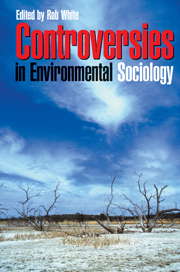Introduction: Sociology, Society and the Environment
Published online by Cambridge University Press: 05 June 2012
Summary
Environmental issues, problems and struggles are central to human life in the 21st century. The relationship between ‘society’ and the ‘environment’ has generated much in the way of both action and analysis over the last thirty years. As local and global environments rapidly change, and as humans modify their behaviour in relation to how and where they live, the importance of studying the interface between society and environment has likewise steadily grown.
Different writers have different conceptions as to what constitutes the most appropriate way to analyse ‘environment and society’, and indeed what to include as part of such discussions. For some, the important thing is to consider particular environmental issues such as soil degradation, declining biodiversity, solid waste problems, chemical pollution, global climate change, use of fossil fuels – the list goes on. For others, the approach may be more conceptual, in the sense of locating debates over and about the environment within the context of social and political theory, such as analysis of different ways in which ‘nature’ is defined and perceived, theorising the relationship between human beings and ‘nature’ and human beings and non-human animals, examining the ways in which industrialisation and globalisation impinge on environments, and exploring the agency of human beings in relation to their environments and as part of social movements about the environment. The complexity and overlap of issues and approaches surrounding the environment means that there will necessarily be myriad different ways in which to study the environment–human nexus.
- Type
- Chapter
- Information
- Controversies in Environmental Sociology , pp. 1 - 7Publisher: Cambridge University PressPrint publication year: 2004



